

The Federal Reserve: Duties. The Federal Reserve: What Is The Fed? The Federal Reserve was created by the U.S.

Congress in 1913. Before that, the U.S. lacked any formal organization for studying and implementing monetary policy. Consequently markets were often unstable and the public had very little faith in the banking system. The Fed is an independent entity, but is subject to oversight from Congress. Basically, this means that decisions do not have to be ratified by the President or anyone else in the government, but Congress periodically reviews the Fed's activities. What Do Banks Look at for Loans? Bank financing can be a key to your small business’ success.
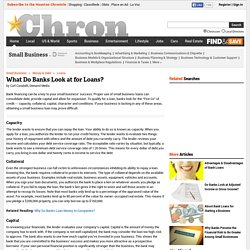
Proper use of small business loans can consolidate debt, provide capital and allow for expansion. To qualify for a loan, banks look for the “Five Cs” of credit -- capacity, collateral, capital, character and conditions. If your business is lacking in any of these areas, obtaining a small business loan may prove difficult. Capacity. What Do Banks Look at for Loans? Savings Accounts - Open a Bank of America Savings Account. Checking Accounts - Open a Checking Account from Bank of America. What is a Certificate of Deposit (CD)? - Personal Finance - WSJ.com. Sold by banks, certificates of deposit (better known as CDs) are low-risk –- and relatively low-return — investments suitable for cash you don’t need for months or years.
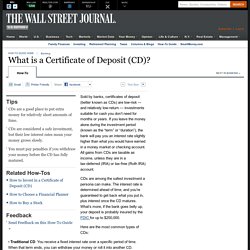
If you leave the money alone during the investment period (known as the “term” or “duration”), the bank will pay you an interest rate slightly higher than what you would have earned in a money market or checking account. All gains from CDs are taxable as income, unless they are in a tax-deferred (IRA) or tax-free (Roth IRA) account. CDs are among the safest investment a persona can make. The interest rate is determined ahead of time, and you’re guaranteed to get back what you put in, plus interest once the CD matures. What’s more, if the bank goes belly up, your deposit is probably insured by the FDIC for up to $250,000. CD Accounts - Open a CD Account from Bank of America.
The Advantages and Disadvantages of Investing in the Stock Market With Personal Finances. Risking personal money for a potential gain is a big step for some individuals.
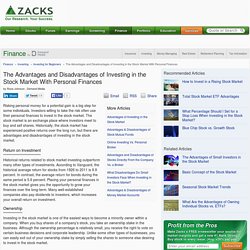
Investors willing to take the risk often use their personal finances to invest in the stock market. The stock market is an exchange place where investors meet to buy and sell shares. Historically, the stock market has experienced positive returns over the long run, but there are advantages and disadvantages of investing in the stock market. Return on Investment Historical returns related to stock market investing outperform many other types of investments. Ownership. Pros and Cons of Banks: Everything You Need to Know. Since the days of keeping valuables locked up in treasure boxes in the form of gold, silver and jewels, people throughout the world have relied on banks to keep their financial assets secure.

However, some people do not trust that banks have their best interests at heart. The role of brokers and financial advisers - Mortgages - Money - The Independent. Greenbank, Edinburgh This five-bedroom home is arranged over three floors of a converted Victorian hospital, offering spectacular views of the Pentland Hills - only three miles from the city centre.

Crossgar, Co. Down This four-bedroom detached home comes with grounds that span to approximately 2.5 acres, as well as two large patio areas and a double garage. Stroud, Gloucestershire. Advantages and Disadvantages of Investing in Mutual Funds. The Advantages: Diversification: A single mutual fund can hold securities from hundreds or even thousands of issuers.

This diversification considerably reduces the risk of a serious monetary loss due to problems in a particular company or industry. Affordability: You can begin buying units or shares with a relatively small amount of money (e.g., $500 for the initial purchase). Some mutual funds also permits you to buy more units on a regular basis with even smaller installments (e.g., $50 per month). Mutual Funds As Financial Intermediaries. Mutual Funds As Financial Intermediaries.
Banks / Financial Intermediaries. Financial Intermediation. Financial intermediaries are firms that pool the savings or investments of many people and lend or invest the money to other companies or people to earn a return.
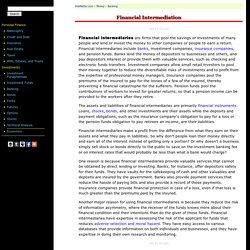
Financial intermediaries include banks, investment companies, insurance companies, and pension funds. Banks lend the money of depositors to businesses and others, and pay depositors interest or provide them with valuable services, such as checking and electronic funds transfers. Functions and Examples of Financial Intermediaries. Definition of financial intermediaries A financial intermediary is a financial institution such as bank, building society, insurance company, investment bank or pension fund.
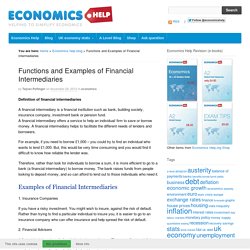
A financial intermediary offers a service to help an individual/ firm to save or borrow money. A financial intermediary helps to facilitate the different needs of lenders and borrowers. For example, if you need to borrow £1,000 – you could try to find an individual who wants to lend £1,000. But, this would be very time consuming and you would find it difficult to know how reliable the lender was.